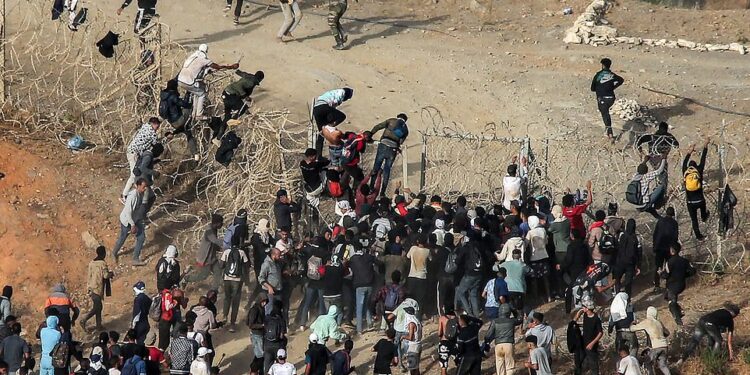Hundreds of migrants scaled barbed wire fences in a desperate attempt to storm into a Spanish enclave in Morocco before being pushed back by riot cops.
The swarm of people, including Moroccans and minors, were seen throwing rocks at security forces as they tried to break into Spain‘s African enclave of Ceuta, near Fnideq in northern Morocco, on Sunday.
Local media reported another mass crossing attempt was also made earlier on Sunday, but was similarly intercepted by Moroccan police.
Sunday was a day of high tension in the area after hundreds of people gathered at the border following reported calls on social media for a collective breach attempt.
The young migrants were mostly Moroccans, but some were from other areas of Africa, the Spanish news agency EFE reported at the time.

Migrants storm a barbed-wire fence as they attempt to cross the land border with Spain’s African enclave of Ceuta near Fnideq in northern Morocco yesterday

The migrants were stopped by Moroccan riot police and sent back home

Hundreds of people gathered at the border following reported calls on social media for a collective breach attempt

The Moroccan interior ministry said that in August, authorities blocked more than 11,300 attempts to cross into Ceuta and 3,300 to Melilla

Many tried to scale fences separating Morocco from the Spanish exclave on Sunday

Hundreds of migrants pressed in a desperate effort to break through Spain’s land border into Ceuta, northern Morocco

Members of Morocco’s Auxiliary Forces deploy to prevent illegal crossings of the land border fence on Sunday
‘The security authorities deported 2,400 people who were likely to try to migrate illegally ”within three days”,’ reported Hespress on Sunday, citing an unnamed official source.
‘They were arrested while heading towards Fnideq in preparation for emigrating to Ceuta.’
Since Friday, Moroccan security forces have been deployed heavily in Fnideq.
‘This is the heaviest security deployment ever in Fnideq with authorities acting pre-emptively by setting up multiple checkpoints on roads to northern Morocco,’ Mohammed Ben Aissa, a local human rights activist said.
A police source told the AFP that 60 people had been arrested between Monday and Wednesday for ‘fabricating and disseminating false information on social media’ to encourage a collective illegal border crossing.
September 15, or, ‘The Promised Day’ saw widespread social media calls for mass migration from Morocco to Ceuta.
The viral messages, spread primarily through platforms like TikTok and Instagram, urged Moroccan youths to gather in the border town of Fnideq and then attempt to illegally cross en masse into Ceuta via the El Tarajal border.
According to Morocco World News, the posts encouraged followers to swim or walk across the border into Ceuta on Sunday, using emojis including Moroccan and Spanish flags.
These ‘publicly announced invitations’ triggered questions of how such secretive operations would be advertised so openly, inducing thousands of Moroccan youths to flock to Fnideq in preparation for what was locally dubbed the ‘Great Escape’.
In response to the ‘Great Escape’ planned by Moroccan youths, Spain has been forced to mobilise additional military reinforcements to the coast of Ceuta.
And across the border, members of the Spanish Civil Guard and National Police have increased their deployment along the border strip, using helicopters to monitor the border fence.
The Spanish enclaves of Ceuta and Melilla are the only land borders between Africa and the European Union and both have witnessed mass influxes of migrants attempting to try to cross the border to reach the EU.

Members of Morocco’s Auxiliary Forces arrest a man after they were deployed to prevent illegal crossings of the land border fence with Spain’s African enclave of Ceuta

Moroccan police pushed back hundreds of people on August 16 who headed towards the Spanish exclave of Ceuta

September 15, or, ‘The Promised Day’ saw widespread social media calls for mass migration from Morocco to Ceuta

The movement was locally dubbed ‘The Great Escape’

Since Friday, Moroccan security forces have been deployed heavily in Fnideq

People attempt to break through a barbed wire fence as authorities rally to prevent crossings on Sunday

Nobody attempting the crossing successfully made it into Spain, the Spanish Interior Ministry confirmed Monday

Migrants make their way up towards the land border from northern Morocco on Sunday
Local reports stated that hundreds of young Moroccans had managed to get as far as Fnideq, the town nearest to Ceuta, before police apprehended them in the night and sent them back to their homes.
The Moroccan interior ministry said that in August, authorities blocked more than 11,300 attempts to cross into Ceuta and 3,300 to Melilla.
But the most popular route from Morocco for migrants hoping to reach Spain is by sea.
More than 22,300 migrant arrivals were registered this year by August 15 in the Canary Islands in the Atlantic Ocean, marking a 126-percent increase from 2023.
Some attempted to breach a border fence that has long been a flashpoint for sporadic migration tensions, but none successfully made it into Spain, the Spanish Interior Ministry confirmed Monday.
It said Spanish and Moroccan security efforts over recent days ‘allowed the situation to be brought under control.’
Morocco and Spain have worked to strengthen cooperation on addressing illegal migration since repairing a diplomatic rift in 2022 over Rabat’s plans for autonomy for Western Sahara.
Morocco’s interior ministry says that in the first eight months this year, authorities stopped more than 45,000 people from illegally entering European territory.
Last month, hundreds of migrants used thick mist as cover to swim to Ceuta, Spanish police said.
In June 2022, human rights organisations in Spain and Morocco called on both countries to investigate after 23 migrants were killed when around 2,000 people tried to breach the border.
Tighter surveillance of Morocco’s northern borders has now prompted an increasing number of migrants to try the riskier and longer Atlantic route to the Canary Islands.







